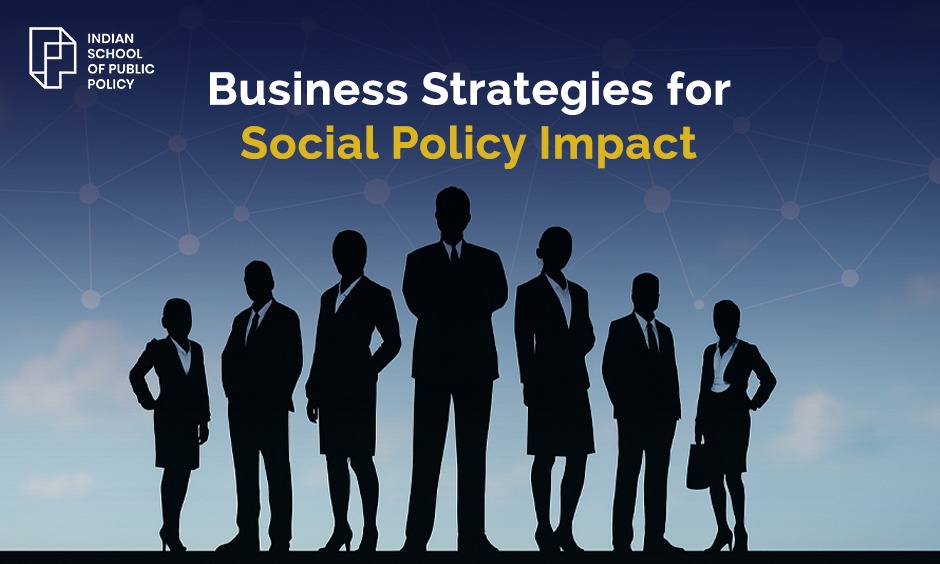
ISPP’s Blend: Business Strategies for Social Policy Impact

Social welfare challenges are getting increasingly complex in today’s world. From education, mental health to climate change and public health, the issues and complexities in these domains are several. In this scenario, their resolution demands more than just good intentions. It requires keen strategic thinking and strategy making.
At the Indian School of Public Policy (ISPP), students are not just armed with an understanding of public policy, but also with strategic insight to create efficient and high-impact programmes and projects, which in the long run solve issues and are scalable. At this juncture social or communal goals meet management knowledge and logic.
The Need for Business Thinking in Public Policy
Cost-efficiency, data-driven decision-making, user segmentation and other such business ideas and strategies can significantly improve how social programmes work.
Real-World Policy Examples Using Business Thinking
- Swachh Bharat Mission: Used behavioural insights to influence toilet usage, focusing on social norms and habits.
- Aarogya Setu App: Applied UX design, analytics, and mobile-first principles to track COVID-19 exposure and deliver real-time alerts.
- Delhi’s Mohalla Clinics: Leveraged lean startup principles like minimal viable infrastructure, prototyping, and feedback loops for decentralized healthcare.
These examples show how non-traditional, business-derived methods can power public impact, when adapted with care.
Inside ISPP: A Unique Curriculum Approach
What sets ISPP apart is its cross-disciplinary model. Scholars at ISPP learn to integrate policy understanding with tools from adjacent disciplines, enabling them to design more holistic and strategic solutions.
Core Subjects at ISPP
- Economics, law, and governance – Build foundational policy literacy.
- Behavioural science – Understand how people make decisions.
- Data analytics and evidence-based policy – Use quantitative insights for better decision-making.
- Ethics and negotiation – Navigate dilemmas with complex trade-offs.
- Design thinking and strategic communications – Create innovative solutions and communicate with clarity.
- Systems thinking – Map interdependencies and manage policy complexity.
Pedagogy at ISPP
- Case study-based learning – Learn from global successes and failures.
- Hands-on simulations and labs – Role-play real-life policy scenarios.
- Mentorship from experts – Faculty includes professionals from consulting firms, government, think tanks, and social innovation labs.
From Classrooms to Change-Makers: How ISPP Bridges Theory and Impact
ISPP’s model is unapologetically applied. Learning doesn’t end in the classroom—it extends into India’s most pressing policy and governance challenges. Every scholar works on a capstone project with real-world partners—government departments, think tanks, or enterprises.
ISPP graduates are not just policy analysts or aspiring bureaucrats. They’re policy entrepreneurs—leaders who combine policy knowledge with market fluency.
Where ISPP Graduates Work
- Think tanks and policy research labs
- Development consulting firms
- Government innovation units
- Public policy arms of tech companies and startups
They’re equally fluent in regulation and revenue models—balancing grassroots realities with boardroom strategy.
Why ISPP’s Policy Model Is Right for India?
India stands at a critical inflection point. As the world’s most populous democracy with rising digital access, inequality, and climate challenges, it needs agile public leaders who can think in systems and act with precision.
ISPP’s Model for India’s Transformation
- Systems thinking – Address root causes, not just symptoms.
- Strategic communication and design – Build citizen-centric policies.
- Behavioral science and data analytics – Deliver measurable outcomes.
- Ethical frameworks – Guide decisions in complex, value-laden environments.
Beyond Trade-offs—Towards Transformation
For too long, social welfare and business performance were seen as incompatible. But the future belongs to changemakers who blend mission with metrics.
ISPP is not just teaching policy—it’s building a new playbook for social change. A playbook where design, strategy, and inclusive values come together to drive sustainable impact.
For those who want to solve problems, not just study them—this is where it begins.
Read more about the programme here: https://www.ispp.org.in/pg-programme-in-public-policy/
FAQs
What makes ISPP’s approach to public policy unique?
ISPP combines business strategies such as cost-efficiency, data-driven decision-making, and user-centric design with core public policy education. This cross-disciplinary model equips students to design high-impact, scalable solutions.
Why is business thinking important in public policy?
Business thinking introduces efficiency, innovation, and sustainability into social programmes. For example, lean startup principles applied in Delhi’s Mohalla Clinics improved healthcare delivery, while behavioral insights strengthened the Swachh Bharat Mission.
What subjects are included in ISPP’s public policy curriculum?
The ISPP curriculum covers economics, law, governance, behavioral science, data analytics, design thinking, ethics, negotiation, strategic communication, and systems thinking.
How does ISPP use real-world learning in its pedagogy?
The pedagogy emphasizes on case studies, simulations, hands-on labs, and mentorship from experienced professionals. Scholars also work on capstone projects with government departments, consulting firms, and social enterprises.
How is ISPP different from other public policy schools in India?
Unlike traditional programmes, ISPP integrates strategic business methods, behavioral science, and design thinking into its curriculum, creating leaders who balance mission with measurable outcomes.
Who should consider joining ISPP’s public policy programme?
Aspiring policy professionals, social entrepreneurs, consultants, and young leaders who want to solve real-world governance and social issues through innovative, scalable solutions will benefit most from ISPP.


